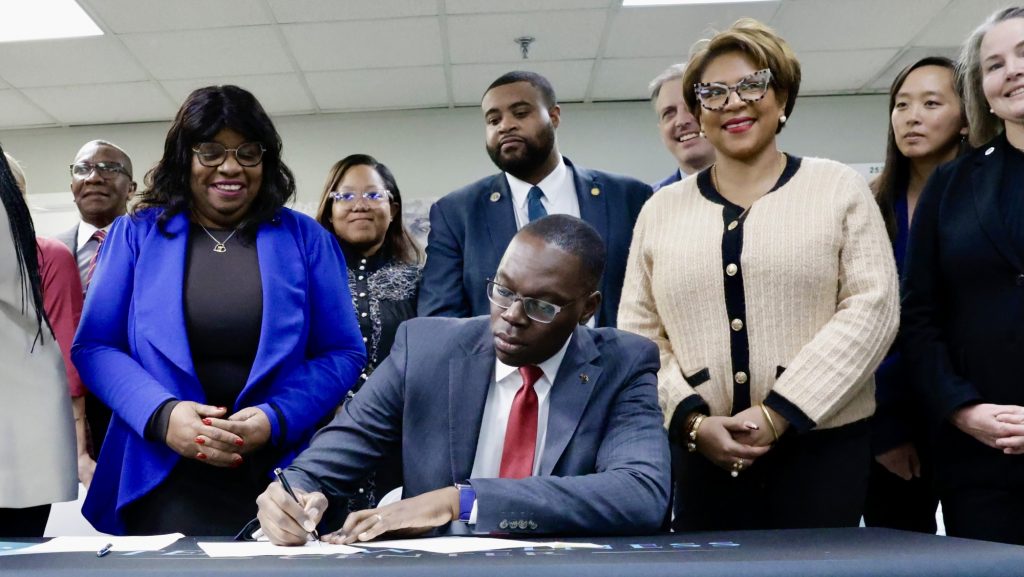Detroit Today: Michigan’s juvenile justice reform, explained
Critics of Michigan’s juvenile justice system highlighted systemic flaws – including poor data collection – that made it difficult to improve youth outcomes.

Lt. Gov. Garlin Gilchrist sign a slate of bills into law in December that aim to reform the state's juvenile justice system.
This week Michigan lawmakers reconvened in Lansing to kick off the 2024 legislative session. And while Democrats begin the session without a majority in the state House, they do so after a term that saw a flurry of activity in 2023.
One of the big wins touted by lawmakers are bipartisan reforms to juvenile justice in the state. In 2021, Gov. Gretchen Whitmer created the Michigan Task Force on Juvenile Justice Reform. Critics of Michigan’s juvenile justice system highlighted systemic flaws – including poor data collection – that made it difficult to improve youth outcomes. In response, the task force was established to develop data-driven recommendations for statewide reform. In December, Lt. Gov. Garlin Gilchrist signed into law a slate of bills that aim to reform the state’s juvenile justice system.
Detroit Today host Stephen Henderson was joined on Thursday by Loren Khogali, executive director of ACLU of Michigan; Nathan Triplett, director of public policy for the State Bar of Michigan; State Sen. Sylvia Santana (D-Detroit); and Kimberly Thomas, director and co-founder of the Juvenile Justice Clinic at Michigan Law to discuss the reforms and whether the legislation goes far enough.
Subscribe to Detroit Today on Apple Podcasts, Spotify, Google Podcasts, NPR.org or wherever you get your podcasts.
Guests:
Loren Khogali is the executive director of ACLU of Michigan. While she supports the reforms recently signed into law, she says the state still falls short in fulfilling the constitutional obligation to provide youth with effective assistance of counsel. She says passing H.B. 4630 — authorizing the Michigan Indigent Defense Commission to fund youth indigent defense and training — would fix the issue.
“The state has committed to funding indigent defense for adults, and quite frankly, children just can’t be left behind in that equation,” said Khogali.
Nathan Triplett is the State Bar of Michigan director of public policy. He says juvenile justice reform not only benefits individuals and families, but also the greater public.
“The path to achieving your full potential is not just a system involvement, it’s getting the supportive resources necessary to be able to develop a career and pursue your passions,” Triplett said, “[and] not be siphoned off into the youth equivalent of the criminal legal system.”
Senator Sylvia Santana is serving her second term in the Michigan Senate representing the 2nd District which includes all of Dearborn and Dearborn Heights, as well as parts of Allen Park and Detroit. She says the newly passed juvenile justice reforms will have a significant impact guiding youth out of the criminal justice system.
“One of the biggest resolutions to the juvenile justice system is being able to divert our youth to community-based programs to help support them in our communities versus sending them to residential treatment centers, which has nationally been proven not to help support youth moving into actual corrections,” Santana said.
Kimberly Thomas is a clinical professor of law, and the director and co-founder of the Juvenile Justice Clinic at Michigan Law. She says the best juvenile court systems have better outcomes by recognizing youth are different than adults.
“Teenagers are very present oriented; they think about today, and not the long-term ramifications of the decisions that are making,” said Thomas. “We want to be able to respond to that in what we’re doing in the juvenile courts.”
Listen to Detroit Today with host Stephen Henderson weekdays from 9-10 a.m. ET on 101.9 WDET and streaming on-demand.
Trusted, accurate, up-to-date.
WDET strives to make our journalism accessible to everyone. As a public media institution, we maintain our journalistic integrity through independent support from readers like you. If you value WDET as your source of news, music and conversation, please make a gift today.
